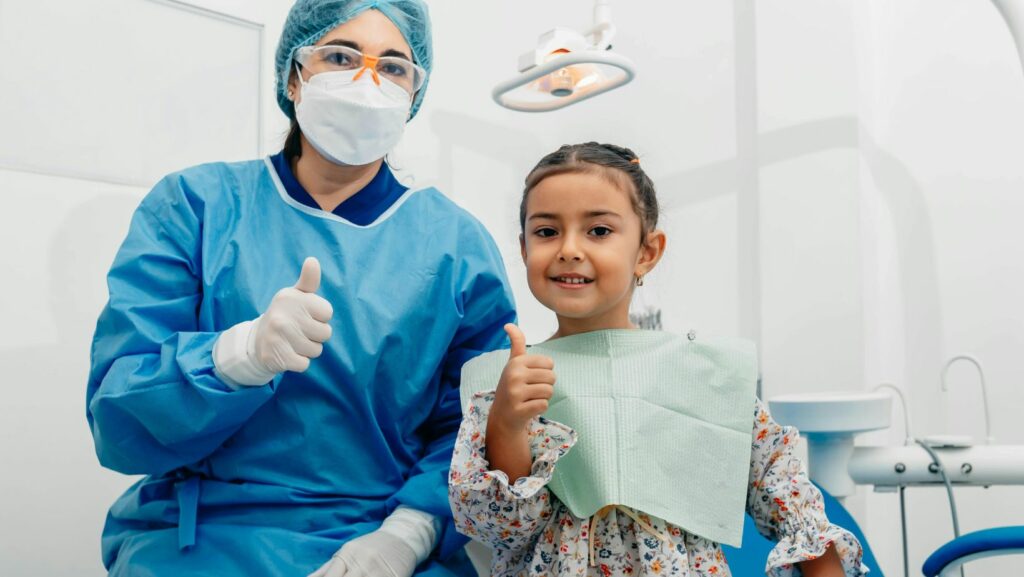For many parents, taking their child to the dentist can feel like navigating a minefield of emotions — anxiety, resistance, and sometimes even full-blown tears. While a fear of the dentist is common among children, the way adults handle those early experiences can shape how they feel about dental care for life. The goal isn’t just to get them into the chair — it’s to help them feel calm, confident, and in control.
And here’s the good news: you don’t need to rely on lollies, toys, or promises of a trip to the playground to make it happen. There are far more effective, lasting ways to help children overcome dental anxiety — and it starts with understanding where the fear comes from.
Understanding Where the Fear Begins
Children aren’t born afraid of the dentist. Most of the time, that fear develops from unfamiliarity, sensory overwhelm, or second-hand anxiety. The sounds, smells, and bright lights of a dental clinic can be intimidating, especially if they’ve never experienced them before.
Sometimes, the fear comes from a parent’s own unease — kids are remarkably good at picking up on subtle cues. If they sense that Mum or Dad is tense about the appointment, they’ll often mirror that anxiety. Even well-meaning phrases like “It won’t hurt, I promise!” can backfire, because it plants the idea that pain might be part of the experience.
A skilled paediatric dentist sydney understands these fears deeply and designs their environment and communication style around reassurance rather than reward. Their goal is to build trust — not to coax compliance through treats or distractions, but to genuinely help kids feel safe and understood.
Make Dental Visits a Normal Part of Life
The best way to prevent fear is through familiarity. If the first time your child visits the dentist is when they already have a sore tooth, the experience can quickly become linked with pain or stress.
Instead, start early. Bring your child to their first check-up as soon as their baby teeth appear, or by their first birthday. These early visits are short and gentle, helping children get used to the sights and sounds of a dental environment without any pressure. They’ll begin to associate the dentist with something routine — like a haircut or a check-up at the doctor — rather than something to dread.
Between visits, talk about the dentist in everyday conversation. You might say, “Dentists help us keep our teeth strong and shiny,” or “We’ll see the dentist soon to make sure your smile stays healthy.” The key is to make it sound positive and matter-of-fact — not a big, scary event.
Model Calm and Confidence
Kids mirror your emotions more than your words. If you show calmness and positivity about dental visits, your child is far more likely to follow suit.
Avoid overexplaining or emphasising potential discomfort. Statements like “It won’t hurt” or “Be brave” imply there’s something to be afraid of. Instead, keep your tone neutral and reassuring: “The dentist is going to count your teeth today” or “They might tickle your gums with a tiny toothbrush.”
If you’re anxious about the dentist yourself, try not to transfer that fear. You don’t have to hide it completely, but it helps to let your child see that you trust the process and that dental care is a normal part of keeping healthy. Children take cues from how you act far more than what you say.
Role Play at Home
Kids love pretend play — and it’s one of the most effective ways to help them process new experiences. Turn a dental visit into a game before the real appointment.
Grab a toothbrush, a mirror, and a few stuffed toys. Take turns being the dentist and the patient. Count teeth, use fun terms like “tooth tickler” for the toothbrush, and talk about how clean and happy the toy’s teeth look afterward.
You can also show short, child-friendly videos or read picture books about visiting the dentist. The idea is to create an experience that feels familiar and safe — something they can understand before it happens. When they arrive at the clinic, nothing feels foreign or threatening.
Let the Dentist Take the Lead
Parents often feel the need to guide or reassure their child during the appointment, but sometimes stepping back can be more effective. Paediatric dentists are trained in child-friendly communication techniques that encourage trust and cooperation.
They might use simple, descriptive language (“We’re going to brush your teeth with a special tickly tool”) or give the child small choices (“Do you want to sit by yourself or on Mum’s lap?”). These little moments of autonomy help kids feel empowered rather than controlled.
If your child seems nervous, let the dentist engage directly with them. You can stay nearby for comfort, but resist the urge to answer for them or intervene too quickly. When children build their own relationship with the dentist, their confidence grows naturally.
Turn the Focus From Fear to Curiosity
Kids are naturally curious — and curiosity is a powerful antidote to fear. Encourage them to explore what’s happening in a way that feels playful and safe.
Before the appointment, you might say, “I wonder what kind of tools dentists use to look at teeth,” or “Do you think the dentist will show you how they count?” Framing the experience as a discovery rather than a test shifts the focus away from fear.

At the clinic, let your child look around and ask questions. Many paediatric practices have bright, friendly decor or interactive tools to make the space feel inviting. When curiosity replaces anxiety, the whole atmosphere changes — for them and for you.
Reinforce Positive Feelings, Not Rewards
It’s tempting to promise an ice-cream stop or a new toy after the appointment, but external rewards teach children to focus on what they’ll get rather than how they’ll feel.
Instead, use positive reinforcement that celebrates effort and courage. Try phrases like:
- “You did such a great job listening and sitting still.”
- “You were really brave letting the dentist look at your teeth.”
- “I’m proud of how calmly you handled that!”
These affirmations help your child internalise the experience as something they can handle — not something they endured just to earn a treat.
Over time, that builds real confidence and resilience, not conditional cooperation.
Create Comfort Through Routine and Predictability
Kids thrive on knowing what to expect. If your child has a consistent pre-appointment routine, the process will feel more manageable.
You might pack their favourite toy or blanket, listen to calming music in the car, or talk about what will happen step by step: “We’ll check in at the desk, wait for the dentist to call us, and then you’ll sit in the special chair.”
For particularly nervous children, you can even ask the clinic staff to walk them through what will happen during the visit. Paediatric dentists often use a “Tell-Show-Do” technique — first explaining what they’ll do, then demonstrating on a model or instrument, and finally doing it gently for real. This transparency replaces uncertainty with understanding, which dramatically reduces fear.
Keep Dental Care Positive at Home
What happens between visits matters just as much as what happens in the clinic. If brushing teeth at home is a daily battle, it can reinforce negative feelings about oral care. Turn brushing time into a fun, shared activity instead.
Try letting your child choose their toothbrush or toothpaste flavour, play a two-minute song while brushing, or brush your teeth alongside them so they can copy you. These little moments normalise dental care and make it part of a happy daily routine.
You can even connect the dots: “The dentist will love how clean your teeth are!” This builds a sense of pride and ownership over their oral health, rather than fear of being judged.
Patience Builds Confidence
Helping kids overcome fear of the dentist isn’t about quick fixes — it’s about building trust, one visit at a time. Each positive experience replaces anxiety with familiarity and turns dental care from something scary into something routine.
By focusing on calm communication, gentle exposure, and positive reinforcement, you’re giving your child tools that last far beyond the dental chair. They’ll learn that fear can be faced — and that courage doesn’t come from bribes or promises, but from feeling safe, supported, and capable in their own right.
And one day, they’ll walk into the dentist’s office without hesitation — maybe even with a smile — simply because you helped them believe it’s a place where they belong.

